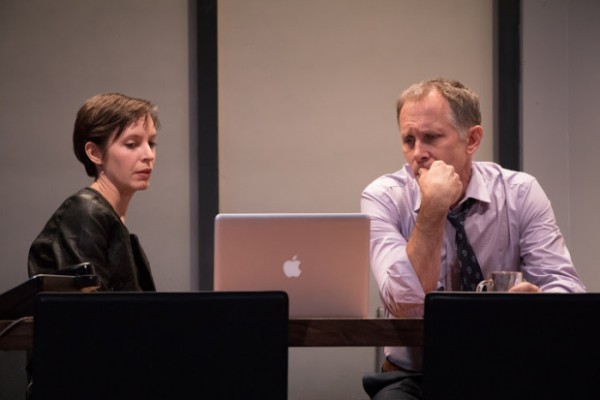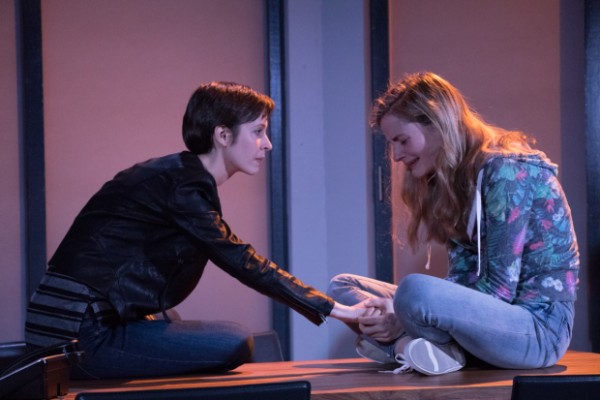
Erika (Jocelyn Kuritsky) and Phil (Bruce McKenzie) tackle a complex story about campus rape culture in STET (photo © Ben Strothmann)
June Havoc Theatre, Abingdon Theatre Company
Abingdon Theatre Arts Complex
312 West 36th St. between Eighth & Ninth Aves.
Tuesday – Sunday through July 10, $51-$76 (pay what you can $5-$20 July 8)
212-868-2055
abingdontheatre.org
You might expect Kim Davies’s STET, a play about campus rape and how it’s reported in the media, to be a didactic, pedagogic, and preachy piece of well-meaning, issue-driven propaganda. It was developed by Davies, new Abingdon Theatre artistic director Tony Speciale, and star Jocelyn Kuritsky, founder of the Muse Project, which calls for “a paradigm shift for female actors.” It has partnered with Take Back the Night, a nonprofit organization that “seeks to end sexual assault, domestic violence, dating violence, sexual abuse, and all other forms of sexual violence.” Several of the performances are being followed by discussions with journalists and survivors of sexual assault. And one of the characters in the play is spreading the word of One in Four, the all-male sexual assault peer education group at colleges and universities around the country that takes its name from various studies that show that approximately twenty-five percent of female undergraduates are victims of sexual assault. But it turns out that STET is a compelling, thought-provoking work that pulls no punches as it explores complex situations with intelligence and finesse. STET was inspired by the controversial Rolling Stone article “A Rape on Campus,” which led to a retraction that shook the world of journalism. Kuritsky stars as Erika, a reporter at a national magazine looking to get her first cover story. Her editor, Phil (Bruce McKenzie), suggests that she take a new angle on the topic, focusing on what it’s like for survivors long after the assault, whether they are able to get back to a more normal life in the aftermath, but Erika says, “I’m just — you know, I’m just kind of raped out? That’s all.” But she ultimately accepts the assignment and tracks down a college student named Ashley Young (Lexi Lapp), who describes in detail how she was raped at a fraternity party by seven pledges. However, she is terrified of using any real names or giving away any specifics that could lead to retaliation, so she is unsure if she wants to be part of the story. Erika also meets with Christina Torres (Déa Julien), a graduate of Ashley’s school who now works as project coordinator for the university’s sexual misconduct response and prevention initiative. “I’m here for people who are in pain, who are suffering, who need someone to help them be okay,” Christina says, “because literally everything else is about the perpetrator of the assault and that is just not my job.” Christina refers Erika to Connor (Jack Fellows), a current student who is cofounder of the school’s One in Four chapter and the vice president of the fraternity where Ashley was allegedly attacked. As Erika investigates further, she gets a better picture of the culture that has grown around campus rape. “I think Ashley has a very . . . um . . . it’s a very clear story for a reader to follow,” she tells Christina, who replies, “Yeah, it’s very easy to understand as rape.” Erika: “Yeah.” Christina: “But a lot of stories aren’t. But that doesn’t mean, you know, that they’re not, um, rape.” Despite telling Phil that she’s “not a sympathetic person,” Erika starts getting more personally involved in the story while trying to maintain her journalistic ethics.

Erika (Jocelyn Kuritsky) tries to comfort Ashley Young (Lexi Lapp) while investigating a difficult story (photo © Ben Strothmann)
STET, named for the term used to tell a typesetter to ignore a suggested change, takes place in Jo Winiarski’s conference-room set, surrounded by opaque walls through which shadows can occasionally be seen. The walls also serve as a backdrop for Katherine Freer’s projections, which include Skyping, text messages, a television interview, and a shower of words as the story takes off. Davies (Smoke) handles the tense subject with great care, avoiding platitudes for the most part while still making her point. “I just don’t see women as victims waiting to happen,” Connor says. Erika responds, “I don’t see women as victims. But don’t you think — isn’t it possible that someone could, you know, get pressured into doing something she doesn’t want to do?” to which Connor replies, “But she’s still choosing to do it, right?” It’s not an easy play to watch, and it does have its occasional lapses, but it’s very effective in its specific exploration of rape culture examined from multiple angles. Don’t be surprised if it has you reevaluating your thoughts on rape and the media long after the play is over. STET has been extended through July 10; the June 30 performance will be followed by a discussion with writers Amanda Duarte and Eliza Bent and activist Kathy Moran.